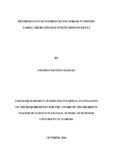| dc.description.abstract | The last five years Kenya has experienced an increase in the number of fully registered Deposit taking micro finance institutions (DTMs) .The objective of this research was to establish the determinants of the interest rates spread in DTMs in Kenya. The research used secondary data collected from individual DTMs, Association of Microfinance institutions in Kenya (AMFIs) and Central Bank of Kenya. The six fully licensed DTMs data was analyzed using regression model for five years (2011-2015). Interest Rate Spread was used as the dependent variable while the independent variables were the determinant of IRS variables which were inflation rate, Operating Costs, Return on Average Assets and Credit Loss Provisions. For secondary data analysis, Descriptive statistics was used since it helps determine a relationship that exists between variables. The Regression analysis was used to test the effect of various determinants on interest rates spreads of Deposit Taking Microfinance institution (DTM) in Kenya. Analysis of variance (ANOVA) was used to test for the reliability and goodness of fit of the regression model that was used in the study. The study results indicated that there is a strong relationship (R= 0.578) between Interest Rate Spread and the determinants (credit loss provisions, operating cost, inflation rate and return on average asset). The R-Square in the study revealed that 22.8% of the changes in Interest Rate Spread of the DTMs in Kenya can be explained by credit loss provisions, operating cost and inflation rate. The study established that credit loss provisions, operating cost and inflation rate affects Interest Rate Spread of the DTM institutions positively while return on average asset had a negative effect on the Interest Rate Spread. The credit loss provisions produced statistically significant positive effect on the IRS hence it is a strong predictor that can be used in determining IRS. It can be concluded that Credit loss provisions had significant effect on the IRS. The study recommends that the DTMs should enhance their Credit policy on loans appraisal and risk profiling policy to reduce the default rate and credit loss provision which will enable them reduce the IRS. Also, the study recommends that the management of the DTMs should aim at reducing operating costs as a way of reducing Interest Rate Spread. The study also recommends that the government of Kenya should come up with fiscal policies aimed at cushioning DTMs from high inflationary pressure. Also, the DTMs should maintain adequate return on asset which makes them less sensitive towards interest income thus enabling them to charge low lending rates and give high deposit rate which will create low IRS in order to attract new customers and increase their competitive advantage. | en_US |



